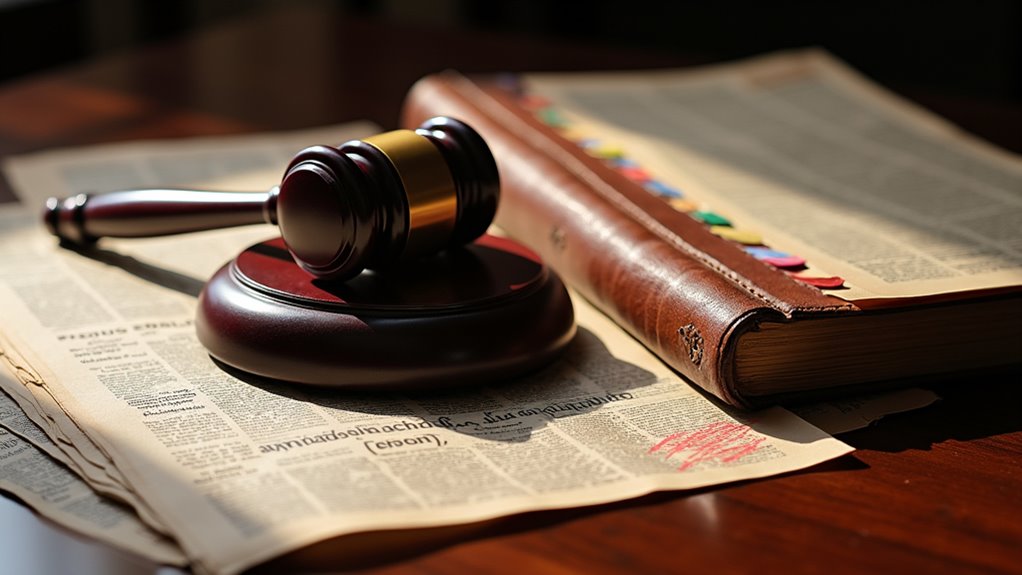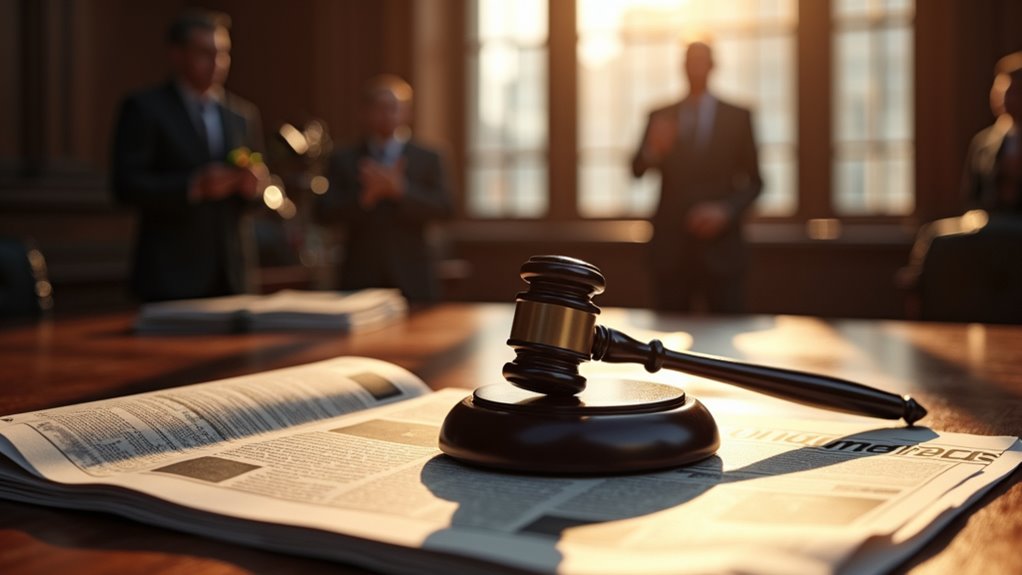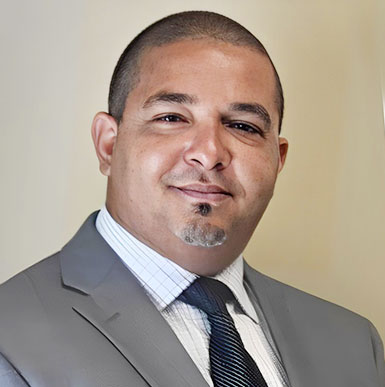Defamation law can strengthen your criminal defense by exposing false accusations and undermining witness credibility. You’ll need to prove the accuser made knowingly false statements that damaged your reputation, while gathering concrete evidence like surveillance footage, digital records, and witness testimonies that contradict their claims. For public figures, you can utilize higher legal standards requiring proof of actual malice. Understanding these strategic defamation elements will help dismantle false criminal charges and protect your rights.
Understanding the Intersection of Defamation and Criminal Law

The intersection of defamation and criminal law presents one of the most complex challenges in modern jurisprudence. You’ll find that criminal defamation cases require stricter evidentiary standards than civil cases, with prosecutors needing to prove falsity beyond reasonable doubt. This heightened burden reflects the serious nature of criminal penalties versus civil damages. Truth as defense remains an absolute protection against criminal defamation charges.
Understanding selective enforcement is vital to your defense strategy. Public officials have historically used criminal defamation laws to silence critics, but courts increasingly scrutinize such prosecutions. The requirement to prove actual malice makes these cases particularly challenging for prosecutors when public figures are involved. You’ll notice that jurisdictions vary greatly in their approach – some states have abolished criminal defamation entirely, while others maintain these statutes.
When building your defense, you’ll need to ponder both the constitutional protections for free speech and the specific elements required for criminal defamation in your jurisdiction.
Leveraging False Accusation Defenses
 When you’re facing false accusations, you’ll need to aggressively challenge your accuser’s credibility by documenting their history of dishonesty and any prior false claims they’ve made against others.
When you’re facing false accusations, you’ll need to aggressively challenge your accuser’s credibility by documenting their history of dishonesty and any prior false claims they’ve made against others.You must build a strong factual foundation that contradicts the accuser’s narrative through concrete evidence like alibis, digital records, and reliable witness testimony. A conviction for filing a false police report could seriously damage their credibility in your case. Maintaining complete honesty with your defense attorney is crucial for developing an effective strategy against false accusations.
Your defense strategy should emphasize patterns of deceptive behavior by the accuser while simultaneously presenting clear, verifiable proof that undermines their claims.
Attack Accuser’s Truth Record
Successfully discrediting an accuser’s truthfulness requires a systematic approach to exposing inconsistencies, uncovering hidden motives, and establishing patterns of deceptive behavior.
To question accuser’s motives, you’ll need to investigate potential financial gains, personal vendettas, or professional advantages they might secure through false allegations. Focus on documenting any history of conflicts, revenge motives, or psychological instability that could explain their accusations. Working with a criminal defense attorney is crucial to properly analyze evidence and build a strong defense strategy. Since even baseless claims can lead to life-changing consequences, it’s vital to act quickly when faced with false accusations.
When you expose inconsistent testimony, methodically compare their statements across different times and contexts. Look for contradictions between their account and physical evidence, witness testimonies, or documented facts. Challenge their credibility by highlighting prior deceptions or false statements in court. Remember to examine whether their recollection might be compromised by stress, bias, or external pressures that could lead to misidentification or fabricated claims.
Prove Statement’s Factual Basis
Proving the factual basis of your client’s defense requires a strategic combination of defamation law principles and criminal defense tactics.
To demonstrate veracity, gather concrete evidence like surveillance footage, DNA results, and digital records that directly dispute falsity in the accuser’s claims. Present alibi evidence and witness testimonies that corroborate your client’s innocence while exposing inconsistencies in the accuser’s narrative. The burden lies with the prosecution as your client remains presumed innocent until guilt is proven.
Leverage defamation standards by documenting how false statements were published and caused measurable harm to your client’s reputation. Since truth is absolute defense, using factual evidence to prove innocence strengthens both criminal and potential civil cases. Cross-examine the accuser’s reliability by highlighting prior contradictions and lack of access to crime details. Use forensic evidence to establish timeline discrepancies, and expose any ulterior motives or conflicts of interest that suggest malicious intent behind the accusations.
Highlight Prior False Claims
To effectively dismantle your accuser’s credibility, you’ll need to strategically highlight their history of false claims through documented evidence and witness testimony. By spotting false patterns and conducting prior case analysis, you can expose their track record of deception. Given that false convictions affect approximately 20,000 people in U.S. prisons, thorough investigation of past allegations is critical. Legal representation is essential to properly investigate and present evidence of prior false accusations.
| Evidence Type | Strategic Value |
|---|---|
| Court Records | Shows dismissed cases and perjury |
| Digital Trails | Reveals timeline inconsistencies |
| Witness Accounts | Confirms pattern of false allegations |
Focus on collecting documentation of past withdrawn accusations, analyzing motives behind false claims, and securing expert testimony about the accuser’s credibility issues. You’ll strengthen your defense by demonstrating how their current allegations mirror previous fabrications. Utilize forensic evidence, GPS data, and communication logs to establish concrete proof of prior deceptive behavior, systematically undermining their present accusations.
Strategic Use of Public Figure Protections

When defending against criminal charges that involve defamation claims, understanding public figure protections can provide critical strategic advantages. You’ll find these protections particularly valuable when dealing with government officials or high-profile individuals who’ve brought claims against you. Proving defamation requires showing multiple elements, including false statements and damages. By leveraging public figure reputation standards and conditional privilege protections, you can markedly strengthen your defense strategy.
A person becomes a limited-purpose public figure when voluntarily participating in public debates or controversies related to the charges.
Consider these key tactical approaches:
- Shift the burden by requiring prosecutors to prove actual malice knowing falsity or reckless disregard for truth
- Assert conditional privileges for statements made about public matters or legitimate business interests
- Challenge the prosecution’s ability to meet the higher proof standards required for public figure defamation claims
These strategies can help dismiss weak claims early and force prosecutors to clear substantial legal hurdles before proceeding with their case.
Challenging Witness Credibility Through Defamation
You’ll find that a witness’s history of making defamatory statements can notably undermine their credibility in your criminal defense case. Establishing a pattern of false statements that have harmed others’ reputations demonstrates the witness’s propensity for dishonesty and creates reasonable doubt about their testimony. While direct evidence of defamatory acts is inadmissible, courts may permit specific instance inquiries during cross-examination. An effective defense strategy involves meticulous techniques to expose the witness’s history of defamation during cross-examination. Through strategic cross-examination and careful documentation of prior defamatory acts, you can effectively challenge the witness’s truthfulness and reliability in the current proceedings.
Past Defamatory Acts Matter
Three key factors make past defamatory acts crucial in challenging witness credibility during criminal defense cases. When an accuser’s reputation includes a documented history of spreading false information, it creates powerful opportunities to undermine their testimony.
Pattern recognition – Multiple defamation judgments or settlements demonstrate a witness’s habitual dishonesty and character assassination tendencies. The court relies heavily on witness testimony to establish critical facts, making a history of false statements particularly damaging.
Documented malice- Internal communications, social media posts, and witness accounts reveal intentional efforts to harm others through false statements
Financial motivations- Prior settlements and monetary gains from defamatory behavior suggest a pattern of exploiting legal proceedings for personal benefit
Credibility Through False Statements
False statements from witnesses present five powerful opportunities for criminal defense attorneys to mount credibility challenges through defamation-based strategies. You can utilize Rule 608(b) to expose prior inconsistent statements during cross-examination, highlighting patterns of dishonesty. When witnesses have histories of making defamatory claims, you’ll find rich territory for exploring witness reliability issues.
The Dollar General case demonstrates how credibility assessments can make or break your defense. You’ll want to scrutinize prior defamatory acts and false accusations to establish a pattern of unreliability. Keep in mind that recent felony convictions, regardless of their nature, can support your credibility challenge. By strategically introducing evidence of past defamatory behavior, you’ll create doubt about the witness’s truthfulness while staying within admissibility rules.
Key Legal Precedents in Defamation Defense
Throughout the evolution of criminal defense law, defamation precedents have established critical constitutional protections and burden-of-proof requirements that shape modern legal strategy. You’ll find these landmark cases provide powerful tools for truth-based arguments and fact-checking prosecution claims.
Key precedents that strengthen your defense:
- New York Times v. Sullivan’s “actual malice” standard requires prosecutors to prove statements were made with knowledge of falsity or reckless disregard for truth
- Garrison v. Louisiana reinforces your right to challenge false accusations by requiring proof of intentional or reckless falsehoods
- Park v. Hill establishes constitutional safeguards at the state level, ensuring prosecutors can’t bypass federal protections through local statutes
Understanding these precedents helps you build a substantial defense strategy while protecting your constitutional rights against unfounded criminal allegations.
Reducing Criminal Charges Using Defamation Elements
Building on these established defamation precedents, you can strategically apply defamation law elements to weaken criminal charges against your client. Challenge evidence admissibility by questioning factual bases and highlighting defamation-based due process concerns. You’ll strengthen your defense by identifying statements that are mere opinions masquerading as facts or lack proper authentication.
Target witness credibility by exposing prior patterns of false allegations and demonstrating bias. Utilize defamation-related privacy concerns to exclude prejudicial content from trial proceedings. You can argue that prosecution must meet heightened standards similar to defamation per se when allegations involve inherently damaging claims. Focus on disproving prosecution narratives through expert analysis and timeline challenges, while emphasizing how defamation’s negligence threshold falls below criminal intent requirements.
Building Effective Counterclaims
When crafting effective counterclaims in defamation cases, you’ll need to strategically utilize both factual evidence and constitutional protections to create a compelling defense. Focus on establishing factual basis through systematic disclosure of supporting evidence while using constitutional safeguards to strengthen your position.
Successful defamation defenses require strategic use of evidence and constitutional protections to establish truth and protect free speech rights.
To build an effective counterclaim strategy:
- Compile verifiable evidence including digital records, receipts, and third-party affidavits to authenticate your statements
- Challenge the opposing party’s claims by demonstrating mutual defamatory conduct and shared fault principles
- Invoke First Amendment rights and anti-SLAPP provisions to defend against frivolous allegations
Remember to preserve all documentation thoroughly and engage forensic experts when necessary to validate your evidence. This detailed approach will help you construct a sturdy defense while potentially creating an advantage for favorable settlement negotiations.
Navigating State-Specific Defamation Defenses
Successfully defending against defamation claims requires a nuanced understanding of your state’s specific laws and procedural requirements. You’ll need to assess qualified privileges and notice requirements that vary by jurisdiction. In Indiana, for example, you’ve got just two years to file, and you can utilize the “substantial truth” defense even if minor details aren’t perfect.
| Defense Type | Requirements | Application |
|---|---|---|
| Truth | Prove statement accuracy | Complete defense |
| Fair Comment | Public interest focus | Protects opinions |
| Qualified Privilege | Reasonable belief | Business/family contexts |
| Section 230 | Online platform status | Federal immunity |
Consider how state-specific protections like opinion privileges and fair report doctrines can strengthen your defense strategy. Keep in mind that privilege defenses only work if you had reasonable grounds to believe your statements were true.
Maximizing Discovery and Evidence Gathering
Thorough investigation and evidence gathering can make or break your criminal defense case. You’ll need to utilize both digital forensic analysis and expert witness scrutiny to build a compelling defense strategy.
Rigorous investigation and expert analysis form the foundation of an effective criminal defense, determining ultimate success or failure.
- Subpoena social media records, device logs, and electronic communications to establish timelines and trace defamatory content to its source
- Challenge witness credibility through cross-examination of prior statements, relationships, and potential motives for false accusations
- Deploy expert witnesses to authenticate evidence, analyze technical data, and provide testimony that supports your defense position
Frequently Asked Questions
Can Defamation Lawsuits Be Filed While Criminal Proceedings Are Still Ongoing?
Yes, you can file defamation lawsuits while a pending criminal case is active. Federal and state laws generally allow these parallel proceedings, though courts may impose stays to prevent interference.
You’ll need to carefully consider timing and strategy, as concurrent cases can increase legal costs and complexity. Be aware that pursuing civil claims during criminal proceedings might amplify public attention and potentially increase reputational damage for all parties involved.
How Long Do I Have to File a Defamation Claim After False Accusations?
You’ll need to act quickly, as statute of limitations for defamation claims typically ranges from 1 to 3 years, depending on your state. Some jurisdictions allow only 6 months to file.
The clock usually starts when the false statement is made, though the discovery rule might apply if you couldn’t reasonably have known about it earlier. Remember, you’ll carry the burden of proof, so it’s essential to gather and preserve evidence immediately.
What Evidence Is Needed to Prove Someone Deliberately Made False Statements?
To prove deliberate false statements, you’ll need to meet the preponderance of evidence standard by gathering concrete proof of both falsity and intent. You should collect direct evidence like recordings, written communications, or witness testimony showing the person’s statements were untrue.
You’ll also need to demonstrate their reckless disregard for truth through documentation that they knew facts contradicting their claims or deliberately avoided verifying information before spreading it.
Does Hiring a Defamation Lawyer Affect My Existing Criminal Defense Strategy?
Yes, hiring a defamation lawyer can impact your criminal defense strategy, which is why you’ll need to prioritize communication between both legal teams.
You should coordinate legal strategies to guarantee they don’t conflict or undermine each other. Your attorneys must work together to maintain consistent narratives, share relevant evidence, and avoid contradictory statements that could harm either case.
This collaborative approach bolsters your comprehensive legal position across both proceedings.
Can Social Media Posts About My Case Hurt My Defamation Defense?
Yes, your social media posts can severely damage your defamation defense. Everything you share online can be used as evidence against you, potentially contradicting your formal statements and undermining your credibility.
To protect yourself, you shouldn’t post anything about your case on social media even seemingly innocent comments can affect public perception and worsen reputational damage. It’s best to stay completely offline or consult your attorney before making any posts.

